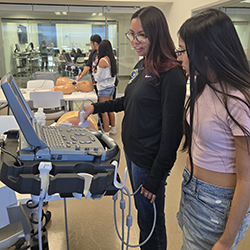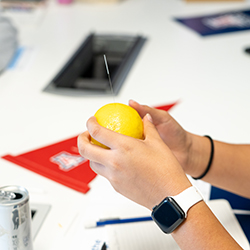High Schoolers, representing tribes from across the state, participated in a variety of interactive sessions
A pillar of the University of Arizona College of Medicine – Phoenix is its engagement with the communities of Arizona. Through educational and service opportunities, the college has long been a leader in creating greater awareness around the importance of health and health care.

In the Center for Simulation and Innovation, attendees got hands on with the ultrasound technology.
Coinciding with that Mission, the Office of Health Care Advancement, in partnership with the *Wassaja Carlos Montezuma Center for Native American Health, recently hosted multiple full-day learning programs for Native American high school students.
“The American Indians into Health Professions led by the Wassaja Carlos Montezuma Center for Native American Health is an important bridge to connect aspiring Native physicians to the U of A College of Medicine – Phoenix,” said Francisco Lucio, JD, senior associate dean of the Office of Health Care Advancement. “It was a delight to expose participants to the opportunities in medicine that are crucial to cultivating a career as a health care worker and physician.”
Over the course of the day, the students met with Gina Buban and Gaby Monterroza from Northern Arizona University’s Physical and Occupational Therapy Programs, who presented the holistic therapy approach taken by professionals in the area; visited the college’s Center for Simulation and Innovation, getting hands-on training with digital imaging, laparoscopy, as well as other technologies used to train medical students; and met with Phillip Leng, PharmD, and other student ambassadors from the U of A College of Pharmacy to learn about the various areas of study within that college. In addition, the College of Pharmacy students led them in an interactive experiment on compounding pharmacy to create lip balm.
The visiting students also toured some of the college’s research labs with Mrinalini Kala, PhD, associate research professor of Internal Medicine and director of the Flow Cytometry Core, and Tim Marlowe, PhD, assistant professor of Internal Medicine, to learn more about ongoing research projects at the college; were treated to a lunch-time session to gain insight on different study tracks, the requirements to apply to the various colleges and how to prepare for medical careers through in-job training opportunities; and met with current medical students — Julie Fan, Fatemah Alzuhairi and Ali Lane — and Jennifer Hartmark-Hill, MD, to explore how the arts and humanities can enhance patient care and foster compassion.

An additional exercise was the finer points of acupuncture with Jonathan Cartsonis, MD.
After the events, participants provided feedback on what they valued most from the day’s learning. “The Rock Star Tour session was the most interesting because we got to do so many simulations. Since I am interested in working at a hospital, being bedside with the patient, I felt like it was something that I want to do in the future,” said a Navajo student from University High School.
Another from the Tohono O’odham Tribe added, “My personal favorite was the art workshop. It felt really peaceful and calming to express the art form from a medical perspective.”
The students who attended represented the aforementioned tribes, as well as the San Carlos, White Mountain, Pascua Yaqui and others.
*The Wassaja Center uses an Indigenous-led framework to work with Tribal Nations, students, practitioners, and community to assist Indigenous families in healing the body, mind, spirit, and environment. The Center uses a culturally appropriate holistic approach through Indigenous knowledge, research, data, public health, law, and policy.
